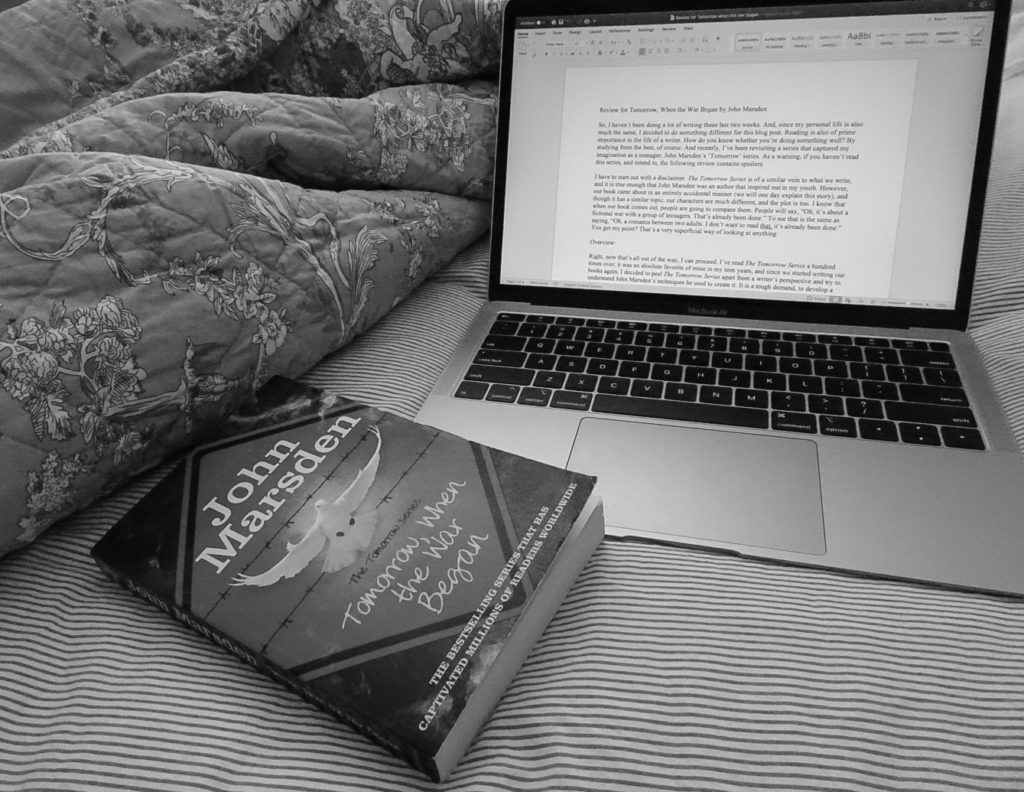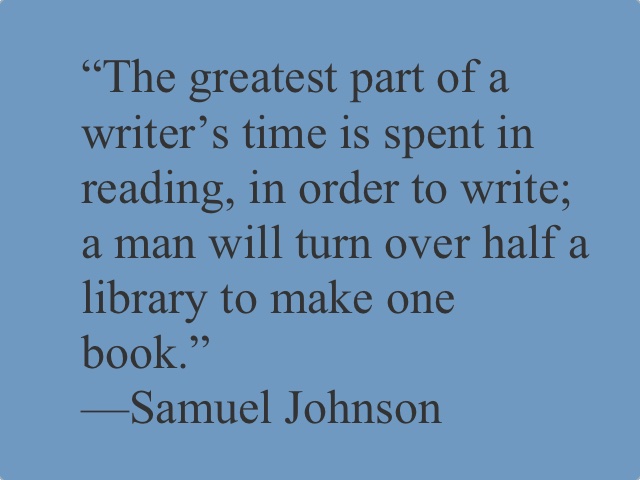Reading is of prime importance in the life of a writer. How do you know whether you’re doing something well? By studying from the best, of course. And recently, I’ve been revisiting a series that captured my imagination as a teenager; The Tomorrow Series by John Marsden. As a warning, if you haven’t read this series, and intend to, the following review contains spoilers.
An Overview
I’ve read The Tomorrow Series a hundred times over. It was an absolute favorite of mine in my teen years, and since we started writing our books again, I decided to peel The Tomorrow Series apart from a writer’s perspective and try to understand John Marsden’s techniques he used to create it. The Tomorrow Series is the closest comparison for our book series, though they differ significantly in structure and plot. Still, the similarities are there; both series focus on a group of teenagers in the midst of war in a realistic setting. Considering this, it makes it worthwhile studying the series.
The book Tomorrow, When the War Began is the first in John Marsden’s series, and follows the protagonist Ellie Linton and her group of friends as they go camping in the bush, and on return, discover that Australia has been invaded by a foreign nation. The group begins by trying to get information on what’s going on, and before long they decide that they must do something to help win back their country. In the finale of the book, they carry out an attack and blow up a bridge, a key transport route.
Ashley and I know only too well that it is a tough demand, to develop a fictional war and weave it into the world as we know it. Books like The Hunger Games and The Divergent Series have fictional wars, but they are more divorced from reality than something like The Tomorrow Series. They have different rules, and different societies. These books, which are categorized in the dystopian branch of science fiction, have their own struggles in developing a world and making rules for that world. Creating this can be tricky, but it has the advantage that, as the creator, you can manipulate these ‘rules’ and the structure of society, which therefore creates believable events. Using our own world comes with a different kind of challenge; making the events seem plausible in a society that readers inhabit every day. The readers already know all the rules of our world, so everything must credibly fit into their experiences of these known rules. I applaud John Marsden for doing such a good job of it.
A Brief Analysis of Book Structure
The book is 22 chapters long, plus an epilogue. It’s approximately 81,000 words all up with an average of 3600 words per chapter, though they range significantly with the longest chapter being around 7000 words, and the shortest being around 1350. As far as a story arc, the inciting event happened quite late; 25% of the way through rather than the recommended 10-15%, which is particularly unusual for a young adult book. Everything else seemed to follow a typical structure.

The Flaws
Please note that I am by no means an expert, and this is my view entirely. I could be quite wrong. Nevertheless, the following is what I think could have been improved.
I was surprised to find that the start of Tomorrow, When the War Began was quite slow. It wasn’t until Chapter 6 when we really dived into the action; a quarter of the way through the book. Marsden spends the first chapters developing characters, the setting, and placing clues. These clues start off slow and increase in number as we get closer and closer to the big reveal of the war. Though I appreciate the slow build of tension, having the inciting event so late is not typical of young adult novels, as teenagers tend to have shorter attention spans and appreciate more action early on (note this is a generality and never bothered me as a teenager. In fact, I was apt to consume whatever book was in the house during my teenage years).
It was interesting to see at first Marsden had a little difficulty in attributing traits to his secondary characters (or at least I believe he did). I can see why they swapped some of the characters lines and activities around in the film. For example, in the book Homer is the first to find the snake “Jesus Christ!…There’s a snake in my sleeping bag!” I can forgive Homer for his brief lapse in courage; I’m pretty sure anyone would react like that to finding something writhing in their bed, but it’s Kevin, the coward, who initially steps forward (with Robyn) to get the snake out. Kevin’s courage is relatively short-lived and he soon freaks out, but I can understand why they changed this in the movie, and made Kevin the one with the snake in the sleeping bag, and Homer as the brave man to fix the situation. Not to say the film did a great job in developing the characters. The film went almost too far in the opposite direction, adhering to stereotypes as a cheap and dirty method to build the characters, which is ultimately why it failed to go large. Anyhow, there were a few other instances too (in the book) where I thought, I don’t think [this person] would say [that]. But, Marsden soon ironed out his characters, and by the sixth chapter, he seems to have a good handle on them.
I think one of his other weaknesses would have to be chapter beginnings and ends, but these do also get better as the book increases pace, and I’ve noted in the next few books of the series he gets more adept at this. Chapter 3 ended with them going to sleep (which, if you’re reading in bed seems an excellent place for you to yawn and go to sleep too). The start of the next chapter wasn’t exactly attention grabbing either, beginning with the sentence “We didn’t do a lot the next day.” They were far from perfect, but on average, like the ending of one of his other chapters, I’d have to say “…it sounded OK to me. Not great, but OK.”
The Well-Crafted Bits

I did like Marsden’s use of nature and symbolism, which was apparent right from the first few pages, where he talks of fallen trees (a recurring symbol throughout the series), and never-sleeping insects making ripples in the water.
The dialogue is clean, having almost a total lack of attributions, which I admire him for. I wish my own writing was as clean. I was already trying to cut down my use of adverbs, but now I am working on deleting attributions completely wherever possible.
When describing characters, I found Marsden often uses animal similes to describe movement, which is quite effective. He described how Kevin was a big guy “…not built for running…lumbered along like a draught horse” and I’m already noting that he uses this technique in his next books, too.
The realism is created through zooming in on vivid details and weaving in texture through sounds, smells and scenery, e.g. “the startled muttering of the chooks” —a line I quite liked.
He also describes feelings in rich detail. That’s something that I’ve worried about after studying numerous writing books. Apparently, you’re not supposed to use words like ‘feel’ and ‘felt’ in your writing, as you are then telling, not showing; a big no-no. I didn’t find this distracting though, and I think considering Ellie’s no-fuss narrative style, it is appropriate for her to describe her feelings in this way. For example: “I felt a new kind of fear now; a kind of fear I hadn’t even known about before.” Maybe it’s my lack of experience as a writer, but I can’t find anything wrong with this. If I had to edit it and draw some kind of anatomical reference about how fear clenches your insides, I guess I could, but it would be a totally different sentence, and probably wouldn’t be true to Ellie’s voice. Marsden also relates to his audience through his use of describing feelings, such as, “It was one of those days where everyone was exhausted from doing nothing.” Everyone knows this feeling, so immediately you know where the character is mentally; tired, but also in that slightly restless state of not having done anything productive.
Finally, what I believe to be Marsden’s strongest skill: The books do well due to his masterful method of building tension. When I first read the books as a teen, the pace was so fast in his action scenes that my cheeks would literally become heated as my eyes skipped across the pages. So how does he manage this? When I write, I’m always scared to outline a plan in too much detail, in case the readers feel like they’re living it twice. But to my surprise I found that outlining the plan so vividly builds more tension, and not less. Why? Because as a reader, you know what’s supposed to happen. And when the plan starts going off the rails, even in small ways, you begin to get nervous for the characters. Marsden did this expertly in the finale, and, just as you can’t take any more tension, he holds it. He did a short flashback. Which, by all accounts I’ve been told you shouldn’t do in the middle of an action scene. If there are any editors out there reading this…yeah, yeah. We know. Flashbacks take the story backwards. Except, in this case, it prolonged the tension and kept you on the edge of your seat as you were waiting to discover the character’s fate.
Overall Impression
I still love this book, and its sequels. Though I now see more flaws then I once did, there are also a whole heap of things that I look at and think; wow. That’s really effective! And I have to mention that it is unbelievably hard to study it piece by piece, as I get so wound up in each chapter that I lose my writer’s eye and become enmeshed in Ellie’s life. More than once I had to backstep when I lost my perception, sometimes even missing where the chapter had ended (NB: I fully admit this despite my earlier complaint, so really the chapter endings can’t have been all that bad). I think that is the true measure of quality: Readers shouldn’t be brought out of the book, and Marsden keeps you rooting for Ellie and her friends, every step of the way.
Have you read The Tomorrow Series? Let me know what you thought was done well, or if you picked up anything you thought could have been improved. I’m interested to hear people’s thoughts in the comments.
~ Sarah.



Leave A Comment